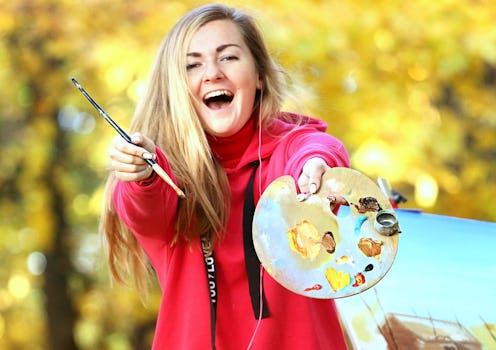Life
The Real Reason Creative People See The World Differently
Being creative isn't necessarily a blessing. Yes, creative people are romanticized across film and media (practically every female rom-com lead is a magazine writer or TV personality, right?), but it's actually hard out there for visionaries. In fact, the real reason creative people see the world differently is actually down to a key difference in our personalities from those who think more logically. Creative people are proven to display more of one specific trait — and it affects everything we do, according to the findings of a new study.
To me, these variations in personality characteristics provide the perfect explanation as to why creative people seem to move through the world at a different pace. I find it hard to implement too much routine and order in my own life (I like to live in what I've heard described as "organized chaos"), and many free thinkers and creatively minded people have lamented as to why it can be particularly hard to maintain a 9-to-5 job.
But this new research has cemented what I always knew all along: That creatives process information differently, and that it's all down to how we're wired. A new study published in the Journal of Personality Research from the University of Melbourne and explained in Science Of Us used the Big Five personality inventory (considered by many to be the most accurate measure of human personalities) to conclude that there is a key difference in how creative and non-creative people behave.
The researchers first had 123 volunteers take the test which analyzes the Big Five traits: Extraversion, agreeableness, conscientiousness, neuroticism, and openness to experience. Study participants also took a vision test called the “binocular rivalry” test, where each eye was made to look at a different image (in this case, a red dot on one side and a green dot on the other). Most people said they saw one color at a time, switching back and forth between each dot, reports Science Of Us. A smaller group however, said they detected something something new: They saw the two dots syncing into one image.
The participants who ranked highly for openness to experience were the ones most likely to report an apparent merging of both the red and green dots. The researchers noted, "Overall, the results showed that openness is linked to differences in low-level visual perceptual experience."
Previous research has also concluded that openness to experience is linked to higher levels of creativity; additionally, it's though that this personality trait correlates with a more developed imagination and greater intellectual curiosity. So when people are extra open to new experiences, their world looks a little different in a very literal sense.
That said, it's not all good for creatives — a 2015 study found that creative people are more likely to behave unethically, for example — it seems that thinking outside the box can be a beneficial and unique resource for your own and other's benefit. However, a study published in the journal Neurology in 2015 found that pursuing creative passions can help stave off dementia, while another piece of research published in PLOS One in 2014 found that creative activities can help mold the “psychological resilience" that helps us manage stressors.
For anyone who isn't considered creative, though, don't worry; creativity should be understood as a learnable resource which you can pick up through adoption of new habits and practice of new skills — and yep, science says this is actually possible. Just remember it's all about finding your strengths, wherever they may lie. And after all, some creative people can wind up thinking they're special just because they happen to be good at hobbies or tasks viewed as "cooler" than more traditional pass-times — and that's certainly no good either.
